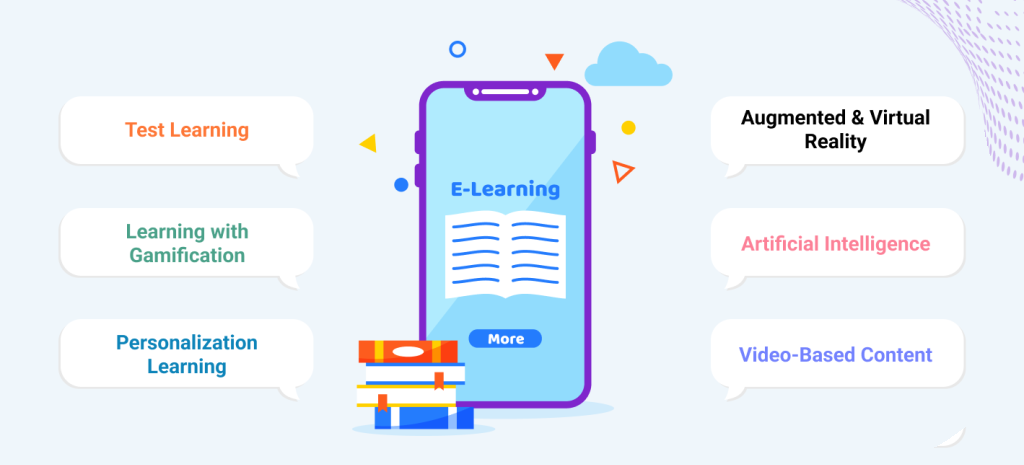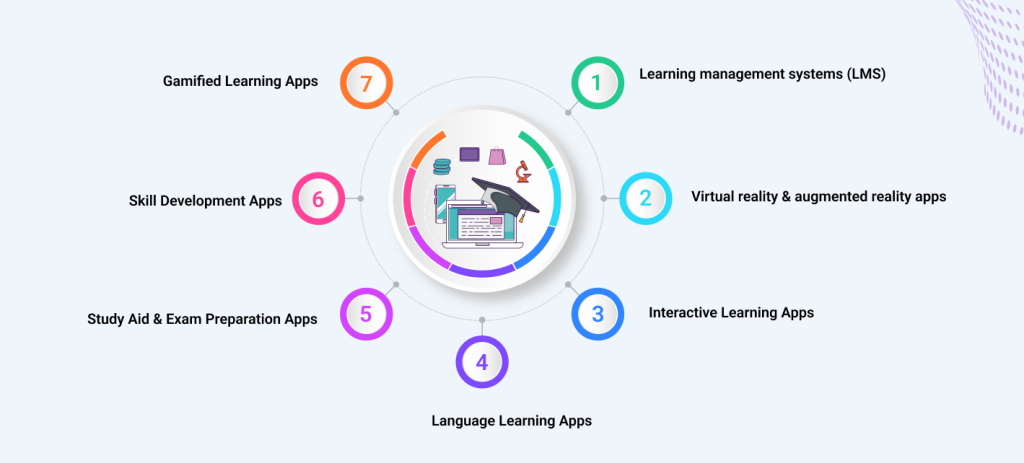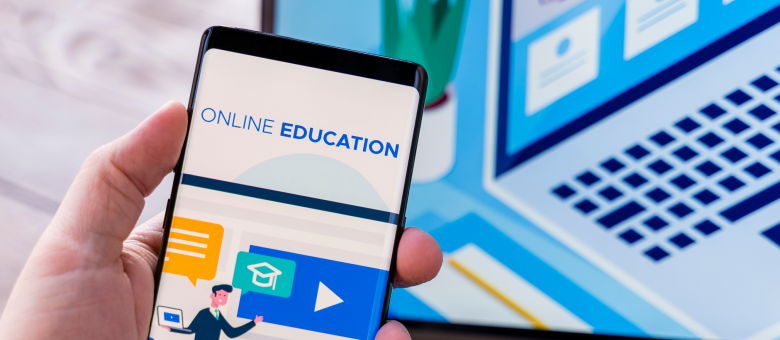Education is undergoing a massive transformation thanks to the top mobile app solutions for ed tech that have changed the learning landscape. As educators and students alike embrace the digital age, mobile apps have emerged as a game-changer in the field of education technology or Ed Tech. These apps are revolutionizing the way we learn and teach, making education more accessible, interactive, and engaging than ever before. In this article, we will explore the top mobile app solutions that are shaping the future of Ed Tech.
From virtual classrooms and personalized learning platforms to interactive study aids and collaborative tools, these apps are empowering students and educators to maximize their potential.
With the ability to access educational resources anytime, anywhere, students can now learn at their own pace and in their comfort zone. These apps also provide valuable data and analytics, allowing educators to track student progress and tailor their teaching methods for better outcomes.
If you’re looking to join the education revolution, keep reading to discover the top mobile app solutions that are revolutionizing education and bringing learning into the 21st century.
Benefits Of Mobile Apps In Education
Mobile apps have numerous benefits when it comes to education. Firstly, they provide access to educational resources anytime, anywhere. With mobile apps, students can learn at their own pace and in their comfort zone. This flexibility allows for a personalized learning experience, catering to individual needs and preferences. Additionally, mobile apps offer a wide range of interactive features, such as quizzes, games, and multimedia content, which enhance engagement and retention of information.
Another advantage of mobile apps in education is the ability to track student progress and gather valuable data. These apps provide analytics that allows educators to monitor student performance, identify areas of improvement, and tailor their teaching methods accordingly. This data-driven approach enables educators to provide targeted support and interventions, resulting in better learning outcomes for students.
Mobile App Statistics In The Education Sector
The use of mobile apps in education has been steadily increasing over the years. According to a report by Research and Markets, the global Ed Tech and Smart Classroom market is expected to reach $404 billion by 2025, with mobile apps playing a significant role in this growth. The report also states that mobile learning is the fastest-growing segment in the Ed Tech market, driven by the increasing adoption of smartphones and tablets.
Furthermore, a survey conducted by EdTechXGlobal and IBIS Capital revealed that 70% of teachers believe that educational apps help students achieve better results.
The survey also found that 80% of students use mobile devices to study, and 90% of students believe that mobile apps enhance their learning experience.
Key Features & Functionalities Of Educational Apps

Educational apps come with a wide range of features and functionalities that enhance the learning experience. These include:
01. Interactive Content
Educational apps often provide interactive content such as videos, animations, and simulations, which make learning more engaging and memorable.
02. Personalization
Many educational apps offer personalized learning paths based on individual strengths, weaknesses, and learning styles. This customization ensures that students receive targeted instruction and support.
03. Collaboration Tools
Educational apps often include collaboration features that allow students to work together on projects, share resources, and communicate with their peers and teachers.
04. Gamification
Gamification elements, such as badges, rewards, and leaderboards, are commonly used in educational apps to motivate students and make learning more enjoyable.
05. Assessment and Feedback
Educational apps often include assessment tools that allow students to practice and receive immediate feedback on their performance. This helps students identify areas of improvement and track their progress over time.
Top Mobile App Solutions For Ed Tech

1. Learning management systems (LMS)
Learning management systems are comprehensive platforms that enable educators to manage and deliver online courses. These systems often include features such as content creation, assessment tools, student tracking, and communication tools.
Popular LMS mobile apps include Canvas, Moodle, and Blackboard.
2. Virtual reality (VR) and augmented reality (AR) apps
Virtual reality and augmented reality apps are transforming the way students learn by providing immersive and interactive experiences. These apps allow students to explore virtual environments, manipulate objects, and engage with complex concepts more tangibly.
Examples of VR and AR apps for education include Google Expeditions, Merge Cube, and Anatomy 4D.
3. Language Learning Apps
Language learning apps have gained popularity among students of all ages. These apps provide interactive lessons, vocabulary practice, and language immersion experiences through audio, video, and games.
Popular language learning apps include Duolingo, Rosetta Stone, and Babbel.
4. Interactive Learning Apps
Interactive learning apps cover a wide range of subjects and topics, offering interactive lessons, quizzes, and games. These apps often come with progress tracking and analytics features to monitor student performance.
Examples of interactive learning apps include Khan Academy, Quizlet, and Photomath.
5. Study Aid and Exam Preparation Apps
Study aid and exam preparation apps provide students with tools and resources to enhance their study habits and prepare for exams. These apps often include flashcards, practice questions, and study planners to help students stay organized and focused.
Popular study aid and exam preparation apps include Anki, Evernote, and Forest.
Learning Management Systems (LMS)
Implementing mobile app solutions in education has proven to be successful in many cases. One such example is the use of learning management systems (LMS) in higher education institutions. LMS platforms like Canvas have transformed the way courses are delivered, allowing for a seamless online learning experience. These platforms provide a centralized hub for course materials, assignments, discussions, and assessments, making it easier for both students and educators to navigate and engage with the content.
Another successful implementation of mobile app solutions can be seen in language learning apps. Apps like Duolingo have made language learning more accessible and enjoyable for millions of users worldwide. With its gamified approach and bite-sized lessons, Duolingo has attracted a large user base, making language learning a fun and interactive experience.
Virtual Reality (VR) and Augmented Reality (AR) Apps
When choosing a mobile app solution for your institution, it is important to consider several factors. Firstly, you should assess the specific needs and goals of your institution and identify the features and functionalities that are essential for your students and educators. Additionally, you should consider the scalability and compatibility of the app with your existing systems and infrastructure. It is also important to evaluate the user interface and user experience of the app to ensure that it is intuitive and easy to navigate.
Furthermore, you should consider the cost and licensing model of the app, as well as the level of technical support and training provided by the app developer. Finally, it is beneficial to seek feedback and recommendations from other institutions or educators who have implemented similar mobile app solutions.
Language Learning Apps
Developing and implementing educational apps requires careful planning and execution. Here are some best practices to consider:
- User-Centric Design
Design the app with the end-users in mind, ensuring that it is intuitive, user-friendly, and visually appealing. Conduct user testing and gather feedback to iterate and improve the app. - Collaboration with Educators
Involve educators in the development process to ensure that the app aligns with the curriculum and learning objectives. Educators can provide valuable insights and feedback to make the app more effective and relevant. - Data Privacy and Security
Ensure that the app complies with data privacy regulations and includes security measures to protect sensitive student information. - Continuous Improvement
Regularly update and improve the app based on user feedback, technological advancements, and changing educational needs.
- User-Centric Design
Interactive Learning Apps
While mobile app solutions have revolutionized education, they also come with their own set of challenges. One of the main challenges is the digital divide, as not all students have access to smartphones or reliable internet connections. This inequality can hinder the adoption and effectiveness of mobile app solutions in certain regions or demographics.
Another challenge is the need for continuous professional development for educators to effectively integrate mobile app solutions into their teaching practices. Educators need training and support to leverage the full potential of these apps and ensure that they align with pedagogical principles.
Looking ahead, the future of mobile app solutions in education looks promising. With advancements in technology such as artificial intelligence (AI), machine learning, and natural language processing, educational apps are becoming more personalized and adaptive. These technologies enable apps to analyze individual learning patterns, provide personalized recommendations, and create tailored learning experiences for each student.
Additionally, the integration of virtual reality, augmented reality, and mixed reality technologies in educational apps is expected to continue to grow. These immersive technologies offer new possibilities for experiential learning, allowing students to explore virtual worlds and interact with digital objects in ways that were previously unimaginable.
Study Aid and Exam Preparation Apps
Mobile apps have revolutionized education by making learning more accessible, interactive, and personalized. From virtual classrooms and personalized learning platforms to interactive study aids and collaborative tools, mobile app solutions are empowering students and educators to maximize their potential.
By embracing these top mobile app solutions for Ed Tech, institutions can provide students with the flexibility and resources they need to succeed in the digital age. However, it is important to carefully consider the specific needs and goals of your institution, as well as the challenges and best practices associated with developing and implementing educational apps.
As technology continues to advance, the future of mobile app solutions in education looks promising. By staying informed and embracing these innovative tools, we can ensure that education remains relevant, engaging, and effective in the 21st century and beyond.
How Implementing Mobile App Solutions In Education Can Create A Lasting Impact?
One of the most significant ways mobile apps are revolutionizing education is through the creation of virtual classrooms. These apps allow students and teachers to connect in real-time, regardless of their physical location.
Virtual classrooms offer numerous benefits, such as the ability to attend classes from anywhere, saving time, and reducing the need for commuting. They also foster collaboration among students from different parts of the world, promoting cultural exchange and a global perspective.
Considerations For Choosing The Right Mobile App Solution For Your Institution
Another groundbreaking aspect of Ed Tech mobile apps is the development of personalized learning platforms. These apps utilize artificial intelligence and machine learning algorithms to create customized learning experiences for each student.
With personalized learning platforms, students can learn at their own pace, focusing on areas where they need more practice and skipping topics they have already mastered. These apps also provide real-time feedback and adaptive assessments, ensuring that students receive targeted support to maximize their learning potential.
Best Practices For Developing and Implementing Top Mobile App Solutions for Ed Tech
Gone are the days of traditional textbooks and boring lectures. Mobile apps are transforming the way students study and interact with educational content. Interactive study aids, such as flashcard apps, gamified quizzes, and interactive textbooks, are revolutionizing the learning experience.
These apps leverage multimedia elements, such as videos, animations, and interactive simulations, to make learning more engaging and immersive. Students can now explore complex concepts visually and interactively, enhancing their understanding and retention of the material.
Challenges And Future Trends In Mobile App Solutions For Education
Collaboration is a crucial skill for success in the 21st-century workforce, and mobile apps are playing a significant role in fostering collaborative learning environments. Collaborative tools, such as virtual whiteboards, group project management apps, and video conferencing platforms, enable students to work together, even when physically apart.
These apps promote teamwork, communication, and critical thinking skills as students collaborate on projects, share ideas, and solve problems collectively. They also prepare students for the future, where remote work and virtual collaboration are becoming increasingly common.
Final Thoughts On Top Mobile App Solutions for Ed Tech
In addition to virtual classrooms, personalized learning platforms, interactive study aids, and collaborative tools, mobile apps also offer a wide range of study aids and exam preparation apps. These apps provide students with additional resources and practice materials to enhance their understanding and performance in exams.
Study aid apps offer features such as flashcards, practice quizzes, and comprehensive study guides to help students review and reinforce their knowledge. Exam preparation apps, on the other hand, provide simulated exams and performance analytics, allowing students to assess their readiness and identify areas for improvement.
Choose Aipxperts as Your Ed Tech Mobile App Solutions Partner!
If you’re looking for a dedicated partner to revolutionize education with top-notch mobile app solutions for the Ed Tech industry, look no further than Aipxperts. We’re here to collaborate closely with you, comprehensively comprehend your educational objectives, and craft a mobile app solution tailored to your unique needs. Our commitment doesn’t end with development; we offer continuous support and maintenance to keep your Ed Tech mobile app cutting-edge and secure. Get in touch with us today to commence your transformative Ed Tech project! Check out our portfolio here.
Top Mobile App Solutions for Ed Tech | Hire experienced developers to create secure and reliable Ed Tech mobile apps from Aipxperts. Contact us for project estimates and enjoy a 15-day risk-free trial period.











